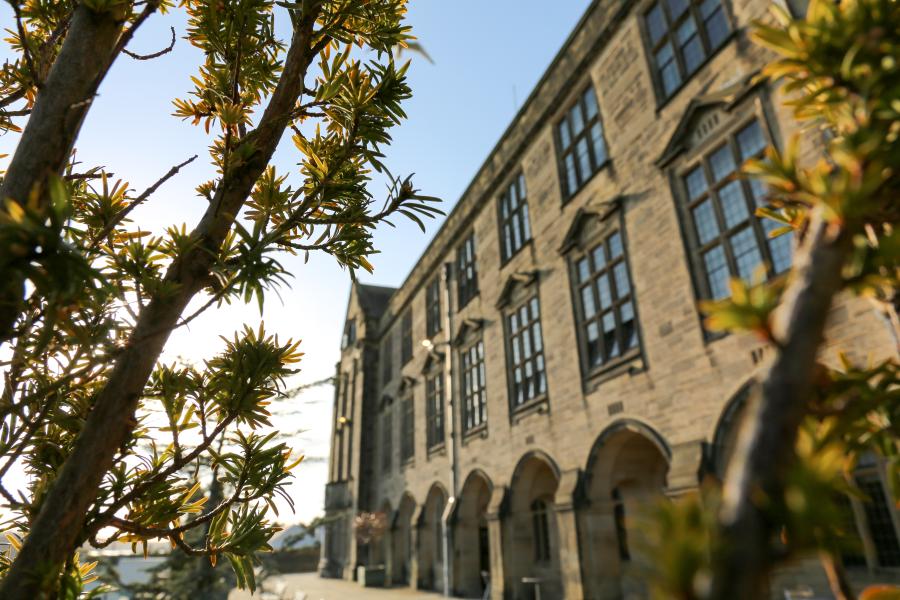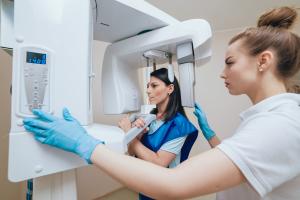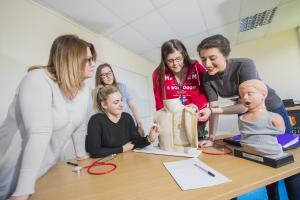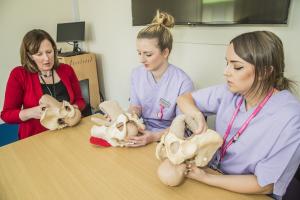Find the right course for you
The foundation year is a year before you start year one of your course. If you don't quite have the necessary qualifications or want to build your confidence in the subject this year prepares you for degree-level study, developing your knowledge of medical sciences together with essential academic, research, and laboratory skills.
Two Degrees. One Strong Foundation.
At Bangor University, both Medical Sciences and Biomedical Science begin with a shared first year — designed to build a solid foundation in human biology, physiology, and the principles of disease. This common starting point ensures every student develops essential scientific knowledge and practical lab skills, while keeping future options open.
Whether you're aiming for a clinical career, NHS registration, or scientific research, this flexible structure allows you to explore your interests and transfer between programmes as your goals evolve.
Take a look below to see how these degrees differ, and the unique opportunities each one could lead to.
Medical Sciences: Bridging Science and Clinical Practice
If you're drawn to the biological basis of disease and considering a future in Medicine, Physician Associate studies, or other healthcare roles, Medical Sciences offers a clinically focused, research-informed route into your career.
This degree explores human health and disease from both scientific and clinical perspectives — helping you understand how the body works, what happens when it doesn’t, and how science can drive better outcomes for patients and communities.
Graduates of Medical Sciences are well-prepared for a wide range of scientific and medical careers. The course provides a strong foundation for postgraduate study in:
- Medicine (including Bangor’s Graduate Entry Medicine programme)
- Dentistry
- Veterinary Science
- Physician Associate Studies
- Allied health roles and clinical pathways
Whether you're aiming for a clinical profession or want to contribute to healthcare through science, this degree opens doors to meaningful, impactful careers.
The Medical Sciences curriculum is mapped to a pre-medical framework and constantly updated to reflect the latest developments in healthcare and research. You’ll explore:
- The structure and function of major body systems
- Disease mechanisms and abnormalities such as diabetes, cancer, and liver disease
- Clinical case studies that connect theory to real-world practice
Teaching bridges the gap between science and medicine, preparing you for further study or direct entry into healthcare roles.
After the shared first year, students of Medical Sciences progress into modules aligned with a pre-medical curriculum. Learning is delivered through:
- Lectures and small-group tutorials
- Digital anatomy sessions using the Anatomage table — a cutting-edge tool for virtual dissection and clinical simulation
This hands-on, clinically relevant approach ensures you graduate with both the knowledge and confidence to take your next step in medicine or healthcare.
Biomedical Science: Practical Skills for Real-World Impact
If you're passionate about laboratory science and want to play a hands-on role in understanding and diagnosing disease, Biomedical Science offers a vocational, professionally aligned route into healthcare and diagnostics.
This degree explores the biology of health and illness at a cellular and molecular level, covering key disciplines outlined by the Institute of Biomedical Science (IBMS). It’s designed for students who want to make a difference through practical science, whether in clinical labs, diagnostics, or medical innovation.
Biomedical Science is built around a lab-focused curriculum that explores the biology of disease in depth. You’ll study:
- Core biomedical disciplines aligned with IBMS standards
- Diagnostic techniques and biomedical technologies
- The Applied Biomedical Science route, which is open to high performing students offers practical experience aligned with NHS training standards and supports progression toward HCPC registration
Biomedical Science is built around a lab-focused curriculum that explores the biology of disease in depth. You’ll study core biomedical disciplines aligned with IBMS standards, providing a strong foundation in the essential areas of biomedical science. The curriculum includes diagnostic techniques and biomedical technologies, equipping you with the skills to understand and utilize the latest advancements in the field.
For high-performing students, the Applied Biomedical Science route offers practical experience aligned with NHS training standards and supports progression toward HCPC registration. This route is designed to give you hands-on experience in a clinical setting, preparing you for a career in healthcare.
From the second year onwards, Biomedical Science students will engage in various learning methods to enhance their understanding and skills. You will participate in hands-on lab work using modern biomedical techniques, ensuring you gain practical experience with the tools and methods used in the field. Interactive lectures and seminars will encourage active participation and critical thinking.
Additionally, group projects and collaborative learning experiences will foster teamwork and communication skills. For those interested in scientific inquiry, optional research projects are available, allowing you to explore your interests and contribute to the advancement of biomedical science.
Students on the Applied Biomedical Science route will gain additional NHS-aligned laboratory training, preparing them for clinical roles and enhancing employability in healthcare and diagnostics.
Do you have a question about life as a Bangor University student? Our ambassadors will be happy to help you find the answer.
They can tell you more about studying here, about the amazing Clubs and Societies we have, and how they made friends and settled into life at university as a Medical Sciences student.
If you have any questions about the course, our lecturers are on hand to help. Below are some examples of frequently asked questions. Can you think of any more?
- What are the qualities of a successful Medical Sciences student at Bangor?
- How can I prepare myself to study Medical Sciences at Bangor?
- How will I know that Medical Sciences at Bangor is the right choice for me?
Our Research in Medical Sciences
At the North Wales Medical School, our research tackles key challenges in medicine using advanced scientific approaches. We focus on improving the patient pathway — whether by filling gaps in medical knowledge or developing practical solutions that enhance health and wellbeing.
A major strength is our work in cancer research, led by the North West Cancer Research Institute, where teams investigate how cancers develop, progress, and resist treatment. This research also drives innovation in therapies and monitoring technologies.
You’ll see this cutting-edge work reflected in your modules and especially in your third-year research project, making your degree current, relevant, and connected to real-world impact.











